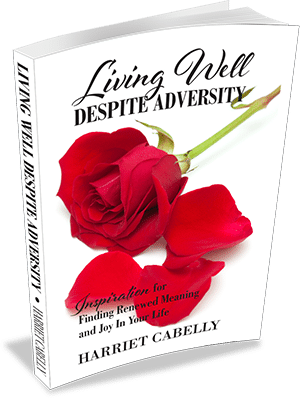by Harriet Cabelly
The nature of life is impermanent, and we are called upon to be in constant movement with the changing of the tide, moving with the ebb and flow of life’s transitions. Some changes call for much more difficult adjustments—those heart-wrenching crises, such as debilitating illness and disability or the loss of loved ones, that brings us to our knees.
However, loss encompasses more than the awful situations that cause us so much pain. The necessary, predictable, and natural courses of life give way to loss as well. For the baby who’s weaning, losing the breast and moving on to the cup is not easy. It might be sad for the parent, too. But we know that moving on to the cup is best for the baby’s growth. During toilet training, too, where he’s losing the security of the diaper and moving on to the toilet, it can be traumatic. Both phases involve a letting go of something in order to move on to the next stage.
Moving away from the familiar, comfortable, and predictable world to unfamiliar territory is uncomfortable and even a bit scary. We are all creatures of habit and we like to stay put. But life isn’t set up like that. We are not static or stationary. As animate beings, we are made to move and grow, otherwise we regress and lose our abilities; our muscles weaken and atrophy. We lose our vim and vigor. What we don’t use, we lose.
We need the ability, both in attitude and behaviors, to handle change. Oftentimes, we’re simply sad to leave the old and move on to the new. Dr. Seuss’s line, “Don’t cry because it’s over, smile because it happened” is a wonderful way to view transitions and life’s natural changes. We can hold them both together. We can cry because the good time is over, but the key is to smile and appreciate that it happened. Tears and joy can stand side by side.
It’s inevitable when we go through any type of change that we experience loss and sadness to some degree, be it the natural and normal life transitions or the critical and severely challenging curveballs that get thrown our way. It is therefore crucial to our well-being to give our unpleasant feelings their due course; in other words, give ourselves permission to feel. Writer Katrina Kenison says it so beautifully: “When we lose anything we cherish—a way of life, a loved one, a dream, a belief, even the day-to-day presence of a child at home—a space that was filled in our lives and in our hearts is suddenly empty. Sorrow, then, is surely a natural human response. And yet how reluctant we are in this noisy, busy, get-over-it-and-move-on culture to give grief its due.”
As we all realize by now, it’s not about our circumstances, but rather our response to our situation. I like to say that “The work is in the ‘hows’: how to live life well despite life’s challenges.”
That’s what I explore in my newly released book, Living Well Despite Adversity: Inspiration for Finding Renewed Meaning and Joy in Your Life. The book features interviews with people who have overcome their struggles and hardship and triumphed through the power of resilience—including Cheryl Strayed, Meredith Vieira, and others. Here’s an excerpt from my interview with Temple Grandin.
Beyond a Label
Temple Grandin is a professor of animal science at Colorado State University. She has pursued her passions, interests, and talents and has succeeded in actualizing her tremendous potential despite having (high-functioning) autism. She is also an author, inspirational speaker, and advocate for autism. Dr. Grandin has been listed in the 2010 Time 100 list of the most influential people in the world.
What personal qualities have helped you carry on and move in a positive direction?
Well one thing is just to have really good motivation. People with autism tend to get fixated on things, and I took my fixation and turned it into a career. My fixations were things like cattle shoots, optical illusions, kites, and building things.
I had some very good mentors. As a teenager I had a great science teacher who got me motivated to become a scientist. Also, Ann, my aunt out at the ranch, and Jim, the contractor—these were really important people in helping me develop. And then, of course, there’s my mother. If I hadn’t had her, I would’ve probably ended up in an institution.
What I see with people who have problems who succeed is that motivation is a really important thing. In my work at the university, I’ve had a number of students who received masters and PhDs with me and I held the back door open for some promising students who didn’t quite have good enough grades to go in the front door. The ones who make it have motivation.
Sometimes you have to push a little bit. You take someone with autism, you have to stretch them. No surprises; surprises scare. But you have to stretch them because if you don’t, then there won’t be any progress. I’m seeing too many kids who are very capable of doing a lot of things, yet they don’t even know how to do laundry or shop or know how to shake hands.
Stretch them, otherwise they won’t advance.
Another thing is build up on the area of strength. My ability in art was always encouraged. When I was a young kid, all I wanted to do was draw pictures of horse heads, and mother would encourage me: ‘Why don’t you do the whole horse?’ You want to broaden it out. You’ve got to learn how to use your ability to do stuff that other people want. People are not interested in just having me talk about cattle shoots; they want me designing cattle shoots. You have to learn how to do tasks that other people would want and appreciate.
I’m a big believer in developing your area of strength. If you’re good with art things, let’s work on art. Some kids are good in math, others are good with words, and some are good with music. Let’s expand on that. Whatever strength a kid has, work on building up that area. It doesn’t matter what it is.
Harriet Cabelly, LCSW, CiPP 2, is a licensed clinical social worker and positive psychology coach whose passion is helping people recover from adversities and create their best possible life. She journeys with them as they learn to cope and grow beyond their painful situations. An engaging speaker and workshop facilitator, Harriet is a coaching expert on the WOR radio show, “Change Your Attitude, Change Your Life”, and has appeared on “ABC News” as a parenting coach. A very fulfilled empty-nester, she loves her work, as well as time with her grandchildren, traveling, and taking on new adventures and learning opportunities..



 Harriet Cabelly, LCSW, CiPP 2, is a licensed clinical social worker and positive psychology coach whose passion is helping people recover from adversities and create their best possible life. She journeys with them as they learn to cope and grow beyond their painful situations. An engaging speaker and workshop facilitator, Harriet is a coaching expert on the WOR radio show, “Change Your Attitude, Change Your Life”, and has appeared on “ABC News” as a parenting coach. A very fulfilled empty-nester, she loves her work, as well as time with her grandchildren, traveling, and taking on new adventures and learning opportunities..
Harriet Cabelly, LCSW, CiPP 2, is a licensed clinical social worker and positive psychology coach whose passion is helping people recover from adversities and create their best possible life. She journeys with them as they learn to cope and grow beyond their painful situations. An engaging speaker and workshop facilitator, Harriet is a coaching expert on the WOR radio show, “Change Your Attitude, Change Your Life”, and has appeared on “ABC News” as a parenting coach. A very fulfilled empty-nester, she loves her work, as well as time with her grandchildren, traveling, and taking on new adventures and learning opportunities..







